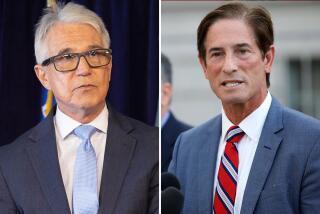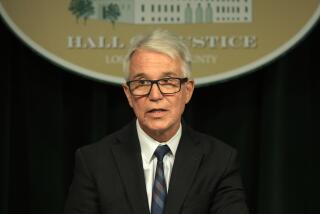Cooley Sees Racial Profiling in Garcetti Policy on Three Strikes
- Share via
District attorney candidate Steve Cooley accused incumbent Gil Garcetti on Wednesday of “engaging in functional racial profiling” by using the three-strikes law to disproportionately send black and Latino recidivists to prison for terms of 25 years to life.
Both candidates intensified their rhetoric in their 13th and next-to-last debate, with Garcetti charging repeatedly that Cooley is “reckless and careless” and that voters need to get to know more about him before casting ballots Nov. 7.
“He is scary,” Garcetti said in the exchange on KPCC-FM (89.3). That prompted Cooley to shoot back that the incumbent is “scared of losing this election.”
Polls have put Cooley ahead of the two-term incumbent, but voters can expect a last-minute blitz of television advertising that could shift the dynamics of the race. Cooley came in first in a three-way contest in March but failed to get enough votes to avoid a runoff with the second-place Garcetti.
Cooley brought up the racial-profiling charge during an exchange about three strikes that otherwise repeated the candidates’ oft-stated differences about how that law should be enforced. The law mandates a term of 25 years to life for a third felony conviction of anyone who has two prior convictions for what are classified as serious or violent felonies.
Garcetti believes in using three strikes in almost all cases in which it can be applied, whereas Cooley believes it should rarely be applied in cases in which the third felony is not violent or serious.
Explaining his policy, Garcetti said: “If both we and the judge agree this person is a continuing danger to the community, even though he may just have been involved in a ‘minor’ crime, he’s going to go away” for 25 years to life. The district attorney gave a hypothetical example of “a known gang member” with prior convictions for carjacking and robbery who is then caught stealing from a department store. Garcetti said he would prosecute that person under three strikes.
Cooley said he wouldn’t. “You must look at the nature of the new offense,” he said.
In the past, Cooley has charged that Garcetti’s enforcement fell more heavily on “certain communities.” On Wednesday, he was more explicit.
“He’s basically engaging in functional racial profiling,” Cooley said. “When he says ‘gangbanger,’ he’s talking about Latinos and African Americans, and raining this law down heavily on them because of their status as a gangbanger. . . . That scares me. That scares a lot of people in this community, because they know it’s unjust, they know it’s not fair, they know it’s not evenhanded, and they would expect us to actually get the gangbanger for doing the gangbanging. That’s what we’re supposed to do.”
The debate otherwise stuck closely to paths the candidates have trodden many times before in their debate-a-thon campaign. If there was a difference, it was in tenor. Both attacked relentlessly and angrily, and neither was above making personal assaults on his opponent.
Garcetti twice described Cooley as “scary,” and in five instances accused him of being reckless. After a particularly scathing attack by Cooley over Garcetti’s acceptance of campaign contributions from the grandfather of a felon, Garcetti declared, “Frankly, I’m embarrassed he’s a public prosecutor right now.”
Cooley said Garcetti had “a lot to be ashamed of.” He accused him of being vindictive and a “failed prosecutor.” He spoke in mocking tones when the subject turned to Garcetti’s loss of two endorsements by law enforcement labor unions.
“Poor Gil,” he said, “everybody’s abandoning him.”
The two candidates’s final debate is Nov. 2 on KCET-TV Channel 28.
More to Read
Get the L.A. Times Politics newsletter
Deeply reported insights into legislation, politics and policy from Sacramento, Washington and beyond. In your inbox twice per week.
You may occasionally receive promotional content from the Los Angeles Times.










